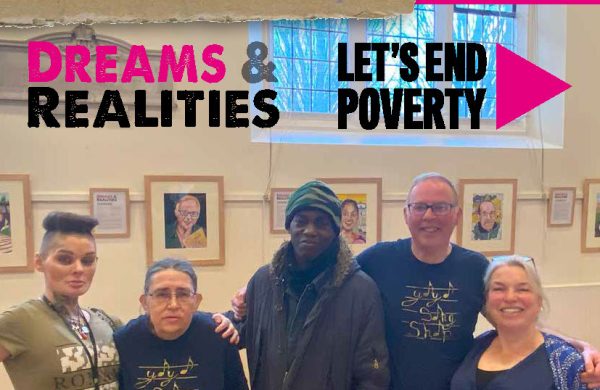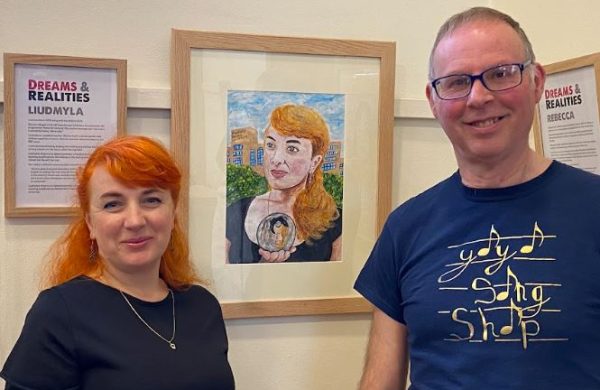Where are the margins?
A report from our 30 April online discussions on what it means to be church on the margins during the pandemic.
Reflection by Stef Benstead
What groups of people are on the margins? [people who lack the resources to change their situation]
- People with disabilities (currently difficult to access care)
- Travellers
- Migrants
- People suffering domestic abuse
- Children experiencing abuse
- People in care centres (cut off from society)
- People in food poverty
- LGBT+
- Homeless (new homeless in London – hospitality workers)
- Single parents
- People who are isolated/alone
- People with no access to technology
- Trans people
- People who have had difficult experiences of church
- People who are ‘othered’ – people who are talked about, not to.
- Black and minority ethnic people (disproportionately affected by the virus)
- Women
- Digital exclusion
- Addicts
- Prisoners/ex-offenders
- Destitute asylum seekers
- Sex workers (especially in current crisis)
- Individuals and families on zero-hours contracts, on the breadline
What causes marginalisation?
- Social and economic systems exclude people, e.g. education. … the structures of our society create margins.
- We need to aware that people may be labelled as marginalised and don’t want to be labelled as such.
- The church has gone online but disabled communities have been ‘doing and being’ church online for years, having been excluded from ‘mainstream’ church.
- How does the church marginalise? Is the church at the centre?
- We can learn from the methods of the Poverty Truth Commission. Church leaders can learn from a PTC – hear the experiences of people in poverty.
- Maybe the church needs a (Poverty) Truth Commission – the meeting of leaders and church members to share experiences and talk honestly about church. An opportunity for people to be heard.
- The church is not marginalised. …. The priest is ‘in charge’.
- For some the economic gap has drastically narrowed. People have suddenly found themselves in difficult situations.
- Some people are unwilling to engage with technology and so are cut off from online activity and community.
- Some people have to comply with systems to get what they need (e.g. PIP), others (richer and powerful) do not have to comply.
- Jesus crossed borders, challenged what was socially acceptable.
How could you move to live, work, be alongside people on the margins?
- ‘We need to go to people on the margins, not wait for them to come to us.’
- We need to adopt relational approaches, befriend people where they are (not expect them to come to church).
- Meet in informal settings, e.g. pubs and cafes.
- Meet online, where many marginalised communities already gather.
- Listen to people who are angry and hurt.
- Admitting our mistakes when we get it wrong (as a church).
- Connecting with LGBT+.
- Bring people together for a shared meal (e.g. people from low-income and more affluent communities).
- Some (Anglican) churches are struggling with ‘resources churches’ taking over in their local area, lots of funding allocated to resource churches.
- Work with local people who have good local knowledge and skills (e.g. Sikh shopkeeper who knows the neighbourhood very well, helping with food provision).
- Some church leaders/hierarchy are currently advising clergy not to deliver food, etc. other people in the community are just getting on with it.

Research and Information Officer
SPARK newsletter summer 2024
Read or download the summer 2024 issue of our newsletter for supporters
Church on the Margins reports
Two reports from our research alongside churches on the margins
Church Action on Poverty North East annual report 2022-24
Download our local group’s report on the right. Download resource Resources Church Action on Poverty North East annual report 2022-24 Download our local group’s report …
Stories that challenge: Sarah and Rosie’s health
This is a guest series, of stories that challenge and change. These are intentionally contrary stories that push back against negative ideas, and force us …
Dreams & Realities: welcome to an incredible exhibition
Learn the story of Dreams & Realities, and the stories behind it Previous Next A powerful new art exhibition has been launched, telling the stories …
Building hopes and dreams in Bootle
“What drives me is people and community. I am passionate about equality and want to see that here in Linacre ward.” Jo outside St Leonard’s …
This outrageous, counter-productive Budget marginalises people with least
This is Church Action on Poverty’s statement on the 2024 Budget. It includes the views of our expert advisors with direct current experience of poverty. …
A sermon for Church Action on Poverty Sunday
Revd Jeremy Tear has kindly shared with us this sermon, which he preached at St Mary’s Great Sankey on Church Action on Poverty Sunday 2024.
Stories that challenge: Emma’s road to church
This is a guest series of stories that challenge and change. These are intentionally contrary stories that push back against negative ideas, and force us …
SPARK newsletter summer 2024
Read or download the summer 2024 issue of our newsletter for supporters
Stories that challenge: Sarah and Rosie’s health
This is a guest series, of stories that challenge and change. These are intentionally contrary stories that push back against …
Dreams & Realities: welcome to an incredible exhibition
Learn the story of Dreams & Realities, and the stories behind it Previous Next A powerful new art exhibition has …



